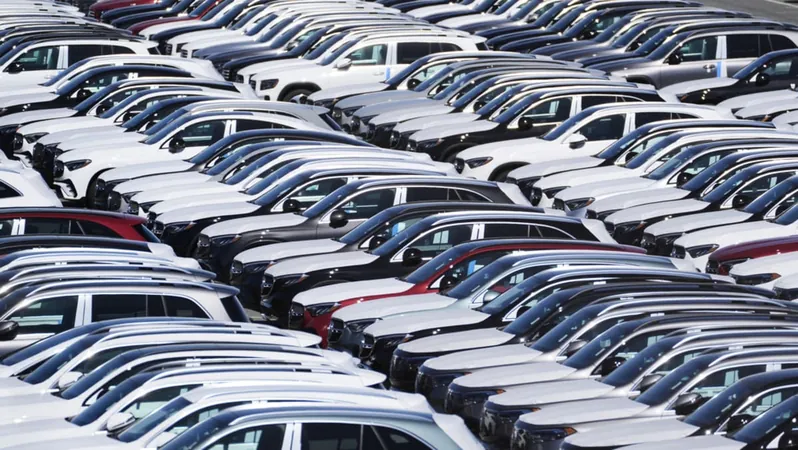
US Auto Tariffs Send Shockwaves Through Global Industry: Are Higher Prices and Job Losses Inevitable?
2025-03-27
Author: John Tan
US Auto Tariffs Send Shockwaves Through Global Industry: Are Higher Prices and Job Losses Inevitable?
DETROIT - In a move that has rattled the automotive industry worldwide, President Donald Trump announced a staggering 25% tariff on auto imports. This dramatic policy shift could lead to immediate price surges on vehicles and raise serious concerns about job losses in major exporting countries, many of which are key allies of the United States.
Experts predict that these tariffs could add thousands of dollars to the average vehicle price in the U.S., exacerbating the ongoing challenges that manufacturers face, particularly as they transition to electric vehicle production. With demand already under pressure, the new tariffs may stifle recovery efforts in an industry still reeling from the impacts of the COVID-19 pandemic.
The stock market reacted swiftly, with most automotive shares plummeting on Thursday. General Motors saw a nearly 7% dip in its stock price, while Ford and Stellantis (formerly Fiat Chrysler) were down about 3%. Counter to this trend, shares of Tesla surged approximately 5%, an anomaly likely attributed to the company’s less significant reliance on foreign imports.
“There's no singular winner in this scenario,” remarked analysts from Barclays, who referred to the tariffs as a "more draconian outcome than most anticipated." German automotive giant Volkswagen echoed this sentiment, stating, “The entire automotive industry, global supply chains, and customers will have to bear the negative consequences.
Historically, the United States has been the largest importer of cars, sourcing a significant portion from countries like Japan, South Korea, and Germany. Nearly half of all cars sold in the United States last year were imports, according to GlobalData, marking the potential impact of these tariffs even more pronounced.
In a bid to navigate these challenging waters, Europe's automotive sector is urgently calling for a transatlantic agreement to avert the tariffs. Following the announcement, major automakers like Volkswagen, BMW, and Mercedes-Benz collectively lost about €5.5 billion (approximately $5.93 billion) in market value.
As manufacturers weigh their options, some have already begun localizing production within the U.S. to mitigate tariff impacts. Volvo, Audi, Mercedes-Benz, and Hyundai have indicated plans to shift some of their manufacturing operations, while luxury brand Ferrari announced price increases of up to 10% on certain models.
On the logistical front, Germany’s BLG Group, which operates one of the busiest auto shipping terminals in Bremerhaven, reported plans for a 15% reduction in traffic attributed to these new tariffs. The tariffs are set to start affecting cars from April 3 and auto parts from May 3, potentially creating immediate shifts in supply and availability.
The implications extend beyond the mere prices; they threaten the integrated auto supply chain established under the North American Free Trade Agreement (NAFTA). Regarding this, the American Automotive Policy Council positioned itself in alignment with Trump’s vision, promising to work with the administration to enhance production and create jobs domestically, although it stressed the need for careful implementation to prevent consumer price hikes.
Cox Automotive forecasts that the tariffs will disrupt nearly all North American vehicle output by mid-April, predicting a reduction of approximately 20,000 cars per day, which amounts to about 30% of total production.
Amidst these economic uncertainties, automakers face a challenging dilemma: determine whether to absorb the tariff costs, increase consumer prices, or streamline production processes. Executives at several firms have expressed concern about making long-term operational decisions under the shadow of potentially volatile policies, emphasizing that economic indicators like the Dow Jones serve as critical benchmarks for the President.
As the situation evolves, the automotive industry and consumers alike must brace for the potential fallout of these tariffs — a move that could reshape the landscape of automotive trade and manufacturing for years to come. What lies ahead for global carmakers and U.S. consumers? The answers remain uncertain, but one thing is clear: the impact of these tariffs is just beginning to unfold.





 Brasil (PT)
Brasil (PT)
 Canada (EN)
Canada (EN)
 Chile (ES)
Chile (ES)
 Česko (CS)
Česko (CS)
 대한민국 (KO)
대한민국 (KO)
 España (ES)
España (ES)
 France (FR)
France (FR)
 Hong Kong (EN)
Hong Kong (EN)
 Italia (IT)
Italia (IT)
 日本 (JA)
日本 (JA)
 Magyarország (HU)
Magyarország (HU)
 Norge (NO)
Norge (NO)
 Polska (PL)
Polska (PL)
 Schweiz (DE)
Schweiz (DE)
 Singapore (EN)
Singapore (EN)
 Sverige (SV)
Sverige (SV)
 Suomi (FI)
Suomi (FI)
 Türkiye (TR)
Türkiye (TR)
 الإمارات العربية المتحدة (AR)
الإمارات العربية المتحدة (AR)